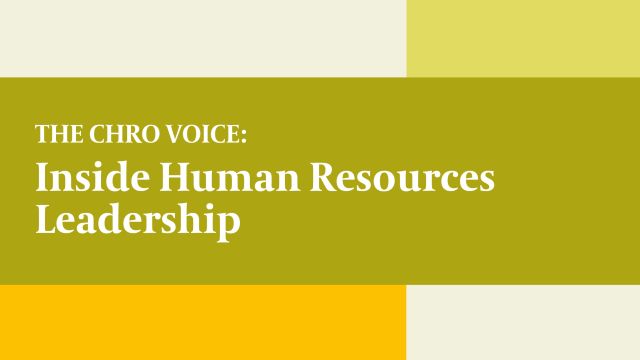You can’t predict everything that’s coming—but if you have the right team, a curious mindset, and the ability to be a true advisor, you’ll be ready.
 Sarah SiddiquiEVP and CHRO of Nordson Corporation
Sarah SiddiquiEVP and CHRO of Nordson Corporation
At a time when AI is reshaping how work gets done, and talent expectations are evolving faster than ever, HR leaders are being called to lead with both strategy and empathy. From succession planning and internal mobility to organizational culture, the role of the CHRO is growingly shaping the business itself.
At a time when AI is reshaping how work gets done, and talent expectations are evolving faster than ever, HR leaders are being called to lead with both strategy and empathy. From succession planning and internal mobility to organizational culture, the role of the CHRO is growingly shaping the business itself.
We sat down with Sarah Siddiqui, Executive Vice President and Chief Human Resources Officer of Nordson Corporation, for a wide-ranging conversation on the evolving role of HR, the future of talent and succession planning, the impact of AI, and how culture remains the foundation for sustainable growth. With clarity, candor, and a deep sense of purpose, Sarah shares how she and her team are building for what’s next—while staying true to what matters most.
From your perspective, how has the CHRO role evolved, and what do you see as the key drivers behind this change?
From your perspective, how has the CHRO role evolved, and what do you see as the key drivers behind this change?
The CHRO role continues to evolve, but more importantly, some aspects are becoming sharper, more well defined. It's fundamentally a business-first CHRO role. I think all our roles, whether you're a CEO, CFO or CHRO, are becoming more blended. We still have distinct responsibilities, of course, but the lines are blurring. While HR is my area of expertise, being a business leader first has become even more critical than it was in a more siloed world, like back in 2010. It was important then, but now it’s even more so. That’s the first big shift.
The second, of course, is AI. It’s the hot topic. We’re still in the early stages, but for a company of our size, in a decentralized industrial environment, quickly understanding and translating how AI will change the way we work and how our business will evolve as a result is going to be crucial. It’s still a bit of an unknown. We understand it better now, but we don’t yet know its full potential in our context. So becoming fluent in that space is key.
And third, which might sound more traditional, is culture and talent. That’s always been part of our role. But now, with the AI revolution already underway and the workplace changing rapidly, it’s critical that we don’t lose the human side of it. As jobs evolve, we need to manage that change in a way that stays human-centric.
As the CHRO role has evolved, how have you brought that evolution to life at Nordson—and what are you most proud of in that journey so far?
As the CHRO role has evolved, how have you brought that evolution to life at Nordson—and what are you most proud of in that journey so far?
There are a few things I’m really proud of. First, our business strategy is very clear—and I give a lot of credit to our CEO and the broader leadership team for that. It makes my job easier when the direction is well defined.
I’ve been at Nordson for about two and a half years now, and one of the things I’m most proud of—going back to what I mentioned earlier about critical skills—is the time I’ve spent building the right HR team. That’s been foundational. I inherited a strong function, and I’ve continued to build on it. Creating the right culture within HR and having the right people in place has really helped us deliver results—and will continue to do so.
Creating the right culture within HR and having the right people in place has really helped us deliver results—and will continue to do so.
 Sarah SiddiquiEVP and CHRO of Nordson Corporation
Sarah SiddiquiEVP and CHRO of Nordson Corporation
Second, we’ve significantly strengthened our talent programs. We’re a classic mid-sized, highly profitable company, and based on feedback from our board and external partners—and from my own experience coming from outside—I’d say we’ve done a really nice job for a company our size. We’ve been able to roll out broad-based programs more quickly, whether it’s first-line supervisory development, high-potential programs, or other skill-building initiatives. We’ve matured our talent offerings in a meaningful way.
Looking ahead, what are you most excited about or curious to explore further in the HR space—especially as you think about the future of work, AI, and talent?
Looking ahead, what are you most excited about or curious to explore further in the HR space—especially as you think about the future of work, AI, and talent?
I think the biggest unknown—and also what I’m most excited about—is the change AI will bring to the workplace. What will that baseline look like? And more importantly, how do we think beyond just productivity?
Yes, there will be productivity gains, especially in areas like shared services, that’s the most obvious application. But the real opportunity is in asking, how can AI help drive business strategy? That’s where it gets interesting. In the industrial space, it’s still a bit of an unknown. Some areas lend themselves well to AI, but there’s also an upfront investment. That’s the piece I’m watching closely. It’s the biggest unknown, and also the most exciting.
Some areas lend themselves well to AI, but there’s also an upfront investment. That’s the piece I’m watching closely. It’s the biggest unknown, and also the most exciting.
 Sarah SiddiquiEVP and CHRO of Nordson Corporation
Sarah SiddiquiEVP and CHRO of Nordson Corporation
The second area I’m excited about is talent. For me, what “great” looks like is having more excellent leaders who are ready to step into roles as they open up. We have open roles, and sometimes we struggle to fill them. So building that pipeline of ready-now talent is going to be a continuing journey for us.
We’ve done well bringing in talent from the outside, which is great, but we want to reduce our dependence on that and really focus on growing from within. So we’re asking: why don’t we have enough internal candidates ready now? What are the barriers? And once we identify those, how can we potentially leverage AI to help? I’d love to connect AI to talent—whether it’s identifying internal matches, surfacing hidden skills, or improving development pathways.
And of course, in more obvious areas like HR services, we already have a strong model. That’s probably the easiest space to apply AI—improving efficiency and enhancing the employee experience. So those are the two areas I’d focus on: talent and services. We’ve just started the journey, but it’s going to move quickly.
With so much change happening, how are you prioritizing talent and engagement—and where is the company in that journey?
With so much change happening, how are you prioritizing talent and engagement—and where is the company in that journey?
Succession remains my top priority, especially for our most critical roles. We make sure we have a deep bench of ready-now talent by having a continuous understanding of what skillsets the future business leader will need. For instance, are they digitally savvy, are they truly global, can they plan to not just execute for now but also have a vision for the next two to three years? I think what we’ve done well is we’ve integrated talent conversations into our business reviews and daily discussions. To me, what good looks like is when you don’t need a separate talent review but instead, talent becomes part of the operating system. Just like your monthly sales forecast, it’s embedded in how leaders think and operate. That’s when you know you’re on the right track. And ultimately, that leads to a strong succession pipeline.
To me, what good looks like is when you don’t need a separate talent review but instead, talent becomes part of the operating system. Just like your monthly sales forecast, it’s embedded in how leaders think and operate.
 Sarah SiddiquiEVP and CHRO of Nordson Corporation
Sarah SiddiquiEVP and CHRO of Nordson Corporation
The second area we’re exploring is how AI will reshape work—not just for leaders, but also for the average worker. It’s still early, but we’re asking the right questions about how roles will evolve and how we can prepare.
We’ve always had traditional engagement activities—things like vision communication—and those still matter. They remain true. But the landscape is evolving very quickly, and the way we work is going to look very different. So we have to ask: how do we keep our integrity, our values, and our soul as a company? Because at the end of the day, Nordson is and always has been a people-centric organization. And people have to stay at the center of what we do.
To me, those are the engagement priorities going forward. The fundamentals—culture, transparency, communication—they don’t change. We’ll still need to engage through those vehicles. But in a fast-changing environment, we have to figure out how to maintain the human side of it all. Especially at a company like Nordson, which is built on relationships, people, and connection.
As the landscape around diversity, equity, and inclusion continues to evolve, how is your organization approaching this topic?
As the landscape around diversity, equity, and inclusion continues to evolve, how is your organization approaching this topic?
The landscape around inclusion has shifted significantly over the past year, but at Nordson, our approach has always been rooted in our core values, especially respect for people. Regardless of external changes, how we treat each other remains constant. We’ve consistently focused on building a culture where employees feel safe, included, and valued. Respect and inclusion are part of our DNA. In recent work on our employee value proposition, one theme stood out: connection. Our people value connection—to each other, to our products, and to the company. As long as we stay true to that, a lot of other things fall into place. And in our latest engagement survey, inclusion once again came through as a clear strength.
Given how the CHRO role is evolving, what advice would you offer to future HR leaders? What critical skills should they build to stay relevant and effective?
Given how the CHRO role is evolving, what advice would you offer to future HR leaders? What critical skills should they build to stay relevant and effective?
I’d go back to some of the evolving aspects of the CHRO role. First and foremost, the most time-tested skill is understanding the business. Whatever resources you can get your hands on, read, get involved, learn. Not only does it build credibility, but it also leads to better decision-making.
The second skill is around technology, especially AI. It’s coming fast, and we need to build fluency. That means reading, exploring use cases, staying curious about what other companies are doing, and understanding what’s possible within our own organizations.
Third is talent. We need to develop a forward-looking view. In today’s world, “long-term” doesn’t mean five years anymore. It might mean two. So whatever space you’re operating in, you need to anticipate what skills will be needed in the near future—both in your organization and in the broader market. That’s how you stay strategic.
Another key skill is being a trusted advisor and having courage. I think we do this well at Nordson—our business leaders really lean on our HR leaders as coaches and thought partners. It’s a safe space, but not just for venting. It’s a space for constructive feedback, for building ideas, and for helping leaders grow. That trusted advisor role and one that speaks truth to power will only become more important.
And lastly, if you’re in an HR leadership role, this one rings especially true for me: build the best team. As I look ahead at what’s coming for Nordson and where the business needs to go, I know I can’t deliver alone. I need to build the strongest HR team possible. That means taking the time to find people who are collaborative, open-minded, curious, and willing to work hard. Because without that foundation, we can’t deliver. Here, collaboration is key. It’s not about having a “my team is the best” mentality—it’s about working together across the board.
You can’t predict everything that’s coming—but if you have the right team, a curious mindset, and the ability to be a true advisor, you’ll be ready.
On a more personal note—how do you manage the demands of your role? What do you do to recharge—intellectually, emotionally, or physically—to keep yourself going?
On a more personal note—how do you manage the demands of your role? What do you do to recharge—intellectually, emotionally, or physically—to keep yourself going?
I maintain a lot of flexibility between work and home. It’s usually pretty seamless. I do travel quite a bit, and I’m lucky to have amazing local teams. So sometimes, if I’m in a location like China, Italy, or Germany, I’ll take a couple of days off and stay back a bit. That’s something I really enjoy. I wouldn’t even call it “recharging”—it’s just something I love to do alongside work. In addition, I always have a book in hand (and it may take me months to finish!) and a morning workout is a must!
For me, work and life are blended, and that works well. Some people, on the other hand, need to fully disconnect—and they should. That’s something we really respect at Nordson. We meet people where they are. We empower them, hold them accountable, and support them in the way they need. At the end of the day, I believe most people want to come in and do a good job. Our role is to create the environment that allows them to do that, whatever that looks like for them.
Niranjana Rajagopal, former consultant Egon Zehnder, co-authored this article.






